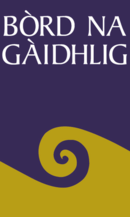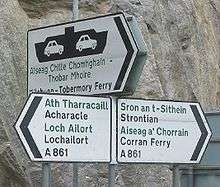Bòrd na Gàidhlig
Bòrd na Gàidhlig (pronounced [ˈpɔːrˠt̪ nə ˈkaːlɪikʲ] (![]()
 | |
| Non Departmental Public Body overview | |
|---|---|
| Jurisdiction | Scotland |
| Headquarters | Inverness |
| Employees | 19 |
| Non Departmental Public Body executive |
|
| Website | www |
Structure
Bòrd na Gàidhlig is a non-departmental public body constituted of members of the board, whose role is "to provide leadership, direction, support and guidance" to the body, and staff who are typically full-time public sector employees and who carry out the day-to-day work of the body. The head of the board is the cathraiche (chairperson) and the head of the staff is the ceannard (chief executive).[2]
The current ceannard is Shona NicIlleathain; not a native Gaelic speaker, she studied the language at the University of Edinburgh and Sabhal Mòr Ostaig and had worked at the Bòrd for twenty years prior to taking over the office in June 2016.[3]
History
In 2006 Bòrd na Gàidhlig was designated as the body responsible for implementing the Gaelic Language (Scotland) Act 2005 and specifically, as stated in the Act, "securing the status of the Gaelic language as an official language of Scotland commanding equal respect to the English language".[4] The Bòrd represents a cornerstone of the Scottish Government's implementation of their duties under the European Charter for Regional or Minority Languages.
The first cathraiche of the eight member Bòrd was Donnchadh MacFhearghais (Duncan Ferguson) from Islay, rector of Plockton High School, former convenor of Comunn Luchd-Ionnsachaidh, Comunn na Gàidhlig, and director of the steering committee for BBC Gaelic programming. In March 2012, following the resignation of Arthur Cormack, who had been appointed in February 2009 after holding the position of interim Chair from July 2008, Elizabeth McAtear was appointed by the Bòrd as interim Chair before the full recruitment process for a replacement Chair.[5]
Aims and duties
Its primary aims are
- to increase the number of Gaelic speakers
- to strengthen Gaelic as a language of community and home
- to promote Gaelic in Scotland's cultural life, and
- to develop the use of Gaelic in every aspect of Scottish life

Its duties are
- to develop a strategic National Gaelic Plan
- to work with organisations with an interest in the language
- to consult on a strategy for Gaelic-medium education
Following a consultation period from October 2003 to January 2004, during which many respondents expressed their concern that any advice Bòrd gives would be likely to be ignored by largely hostile authorities, it was announced in September 2004 that the Bòrd was to be strengthened in several areas:
- the Bòrd's guidance to local authorities on Gaelic medium education will be statutory;
- it can advise all public, private and voluntary bodies;
- it will decide on how to focus Gaelic language development and will determine which organisations should produce language plans.
Criticism
The Bòrd has been criticised for inconsistent and questionable funding priorities. In 2009, the Bòrd cut off funding for the Gaelic-language magazine, An Gàidheal Ùr, after ten years of successful publication. The editor of the newspaper also criticised the Bòrd's excessive bureaucracy, stating that he had been "spending more time dealing with Bòrd na Gàidhlig in trying to access funding than producing the paper."[6] The organisation's funding of Ùlpan courses has also received scathing criticism, with one student stating that his course was neither "structured nor logical" despite over 250,000 pounds allocated for course development in 2012 alone.[7]
In 2015, one of the academics who had advised on the foundation of the Bòrd described the organisation as in need of reorganisation and having "lost its way" after the chief executive, Iain Campbell, quit after only three months and was replaced by the non-Gaelic-speaking Joe Moore.[8]
See also
- Gàidhealtachd
- Languages of Scotland
- Language revitalization
- Pròiseact nan Ealan
- Columba Project
- Foras na Gaeilge, all-Ireland agency set up to promote the Irish language under the Good Friday Agreement of 1998.
References
- "About the 'Bòrd na Gàidhlig' (English) ", gaidhlig.org.uk, 2006, Retrieved 5 April 2010
- Bòrd na Gàidhlig Framework Document. Archived from the original on 22 July 2015. Retrieved 22 July 2015.
- "Bòrd na Gàidhlig a' fastadh Ceannard Ùr". Bòrd na Gàidhlig. Archived from the original on 16 January 2017. Retrieved 14 January 2017.
- Gaelic Language (Scotland) Act 2005, http://www.legislation.gov.uk/asp/2005/7/contents, retrieved 24-6-2011
- "Statement on Bòrd na Gàidhlig and the resignation of Arthur Cormack from the Scottish Government". Scottish Government. 7 March 2012. Retrieved 7 March 2012.
- "Bord blamed for the demise of An Gaidheal Ur". Stornoway Gazette. Retrieved 14 January 2017.
- Ross, David (6 February 2012). "Key target is missed in bid to save Gaelic". The Herald. Glasgow. Retrieved 26 July 2016.
- "Review of Bord na Gaidhlig long overdue, says professor". BBC News. BBC. Retrieved 14 January 2017.